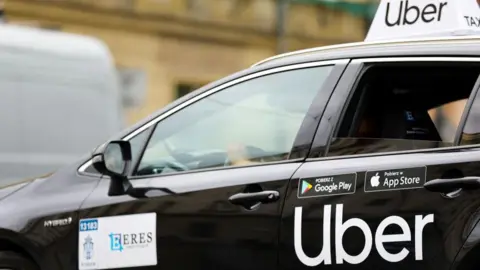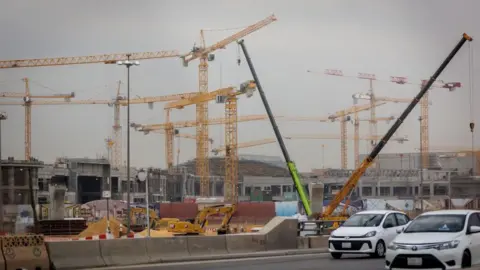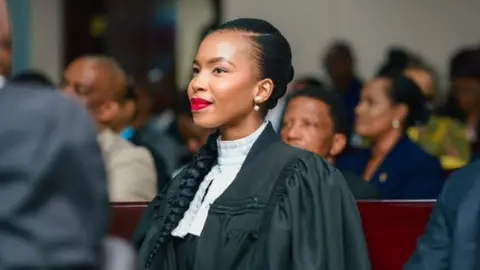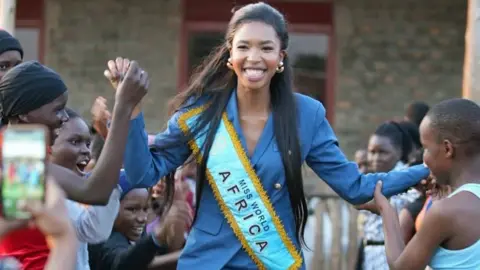Foreign News
Four children found alive in Amazon after 40 days

Four children have been found alive more than a month after their plane crashed in Colombia’s Amazon jungle, the country’s president has said.
The siblings, aged 13, nine, four and a one-year-old baby, were on board the plane with their mother, a pilot and a co-pilot when it crashed on 1 May. Their mother and the other adults on board the plane died.
President Gustavo Petro said finding the children after weeks of searching was “a joy for the whole country”. He called it a “magical day”, adding: “They were alone, they themselves achieved an example of total survival which will remain in history. “These children are today the children of peace and the children of Colombia.”
A massive search began and in May, rescuers recovered items left behind by the children including a child’s drinking bottle, a pair of scissors, a hair tie and a makeshift shelter. Small footprints were also discovered, which led search teams to believe they had survived the collision.
The children belong to the Huitoto indigenous group and members of their community hoped that their knowledge of fruits and jungle survival skills would give them a better chance of surviving. Indigenous people joined the search operation and helicopters broadcasted a message from the children’s grandmother, recorded in the Huitoto language, urging them to stop moving to make them easier to locate.
Colombia’s president came under criticism last month when a tweet published on his account announced that the children had been found. He erased the tweet the next day saying that the information – which his office had been given by Colombia’s child welfare agency – could not be confirmed.
Petro shared a photograph of several members of the military and Indigenous community tending to the siblings, who had been missing for 40 days.He said the children were now receiving medical attention – and that he had spoken to their grandfather, who told him “the mother jungle returned them”.
The Cessna 206 aircraft the children and their mother had been travelling on was flying from Araracuara, in Amazonas province, to San José del Guaviare, when it issued a mayday alert due to engine failure.
The bodies of the three adults who had been with them were found at the crash site by the army.
Preliminary information from the civil aviation authority suggested the children escaped the wreckage and had wandered into the rain forest to find help.
(BBC)
Business
Trump heads to Saudi Arabia eyeing more investment in US

With US President Donald Trump due to visit Gulf states this week, a key focus will be securing significant new investment for the US economy.
“President Trump wants the announcement [of more Gulf money for the US],” says economist Karen Young, a senior fellow at the Middle East Institute think tank.
“He wants to have a big poster in a meeting that describes where these investments might go. And some estimation of what they will do to the American economy in terms of job creation or his big push, of course, on domestic manufacturing.”
Trump is due to arrive in the Saudi capital, Riyadh, on Tuesday 13 May, to meet the country’s de facto leader Crown Prince Mohammed bin Salman.
Trump is then expected to attend a summit of Gulf leaders in the city on 14 May, before travelling to Qatar that same day, and then ending his three-day trip in the United Arab Emirates (UAE) on 15 May.
The economic importance of the region to Trump is highlighted by the fact that the visit to Saudi Arabia was due to be the first overseas trip of his second term in the White House. That was before the death of Pope Francis necessitated Trump attending his funeral in Rome towards the end of April.
Saudi Arabia was also the first country that Trump visited during his first term of office, going against the modern practise of US presidents to start with the UK, Canada or Mexico.

Securing new investments in the US from Gulf states, and particularly from their state-backed sovereign wealth funds, will help Trump to signal back home that his “America First” agenda is delivering results.
The presidential visit is drawing top Wall Street and Silicon Valley leaders to Saudi Arabia. A Saudi-US investment forum on 13 May in Riyadh will feature CEOs from BlackRock, Palantir, Citigroup, IBM, Qualcomm, Alphabet, and Franklin Templeton.
The push comes amid economic headwinds, as President Trump’s new import tariffs have significantly disrupted global trade, confidence, and the US economy itself. US economic output fell in the first three months of this year, its first fall in three years.
Back in January, Prince Mohammed said that Saudi Arabia would invest $600bn (£450bn) in the US over the next years. However, Trump has already said that he’d like that to rise to $ 1tn, including purchases of more US military equipment.
According to Ali Shihabi – a Saudi commentator and author, with close ties to the Saudi government – a number of economic agreements will be signed during the trip.
“These deals will further integrate the Saudi and US economies together, joint ventures in the kingdom, in the United States, procurements of American weapons and goods,” says Mr Shihabi.
Saudi Arabia’s sovereign wealth fund, the Public Investment fund (PIF), which controls assets worth $925bn, already has numerous investments in the US. These include Uber, gaming firm Electronic Arts, and electric car firm Lucid.
Meanwhile, the UAE has already committed to investing $1.4tn in the US over the next 10 years, in sectors such as AI, semiconductors, energy and manufacturing. This was announced by the White House in March after the UAE’s national security advisor, Sheikh Tahnoon bin Zayed Al Nahyan, met President Trump in Washington.
Yet Ms Young from the Middle East Institute says that the scale of these investments is not realistic in the short term. She instead says that they are long-term strategic moves, and that the figures should be taken “with a little bit of a grain of salt”.
Regarding specific deals that could be announced during Trump’s visit, it is widely reported that Saudi Arabia will agree to buy more than $100bn of US arms and other military items.
These are said to include missiles, radar systems and transport aircraft.
The US has been a longstanding arms supplier to Saudi Arabia, but in 2021 the then Biden administration stopped selling Riyadh offensive weapons, citing concerns about the country’s role in the war in neighbouring Yemen.
The 2018 killing of Saudi journalist Jamal Khashoggi was also widely reported to be a factor. A US report said that Prince Mohammed had approved the murder.
The Biden White House resumed the sale of these weapons last year. While it cited that the Saudis had stopped bombing Yemen, some commentators said that the US was seeking Saudi assistance to help end the conflict in Gaza and aid its future reconstruction.

Mr Shihabi says Saudi Arabia will be seeking assurances from the White House that the US will implement a “more efficient procurement system”, enabling the Gulf state to access ammunition and military equipment far more quickly and easily.
“The Trump administration is initiating procedures to facilitate those deals. So, it’s expected that this process will improve immediately,” he adds.
Artificial intelligence is the other topic that will dominate the agenda during Mr Trump’s visit. Talks are expected to centre on attracting greater Gulf investment into US tech firms, and boosting the region’s access to cutting-edge American semiconductors.
The UAE and Saudi Arabia have been investing billions of dollars into tech and AI sectors as try to diversify their economies away from oil.
The Emiratis, in particular, are keen to establish themselves as a global AI hub.
Last week, the Trump administration scrapped the Biden-era chip regulations that placed restrictions on exports of advanced US chips to more than 120 countries including the Gulf states.
The White House is expected to draft new rules that would potentially involve direct negotiations with countries like the UAE.
“For the UAE, this is absolutely essential,” says Ms Young. “They are aggressively building out their AI capacity. So, for them getting access to US technology is imperative to be the best.”
While much attention will be on Trump courting Gulf capital for the US, Saudi Arabia is equally focused on drawing American investment into its ambitious Vision 2030 program.
Led by giant construction projects, such as the building of a linear city called The Line, Vision 2030 is central to the Saudi government’s continuing efforts to diversify the country’s economy away from oil.
It also involves pouring resources into entertainment, tourism, mining and sports.
However, foreign direct investment into Saudi Arabia declined for a third straight year in 2024, reflecting persistent challenges in attracting overseas capital.
The fall in global oil prices since the start of the year has further strained Riyadh’s finances, increasing pressure to either raise debt or cut spending to sustain its development goals.
Oil prices tumbled to a four-year low amid growing concerns that a trade war could dampen global economic growth.
The decline was further fuelled by the group of oil producing nations, Opec+, announcing plans to increase output.
Saudi Arabia is part of that group, and some commentators said that the rise was in part a desire to please Trump who has called for lower oil prices.
Other analysts said the reason was more that Opec+ remains confident that the global economy is growing.
The US-Saudi Business Council, is an organisation that aims to boost trade ties between the two countries.
It is hoping that Trump’s visit will push American businesses to explore more opportunities in Saudi Arabia, especially in sectors like AI, healthcare and education.
“The Saudi government is looking heavily to invest in these sectors. There is a very big appetite for Saudi companies to collaborate with American companies,” Hutham Al Jalal, who heads the Riyadh office for the organisation, tells the BBC.
Saudi officials are said to be confident that some deals in these sectors will be secured during Trump’s visit.
For Saudi Arabia, Trump’s visit is about strengthening ties with their longest-standing Western ally – a relationship that grew strained during the Biden years. For President Trump, it is about landing investment deals that can be framed as a win for his economic agenda.
“President Trump is looking for a headline of big investments in America, and he will get that from this trip,” adds Mr Shihabi.
[BBC]
Features
‘Proud to be young’ – Beauty queen, lawyer and Botswana’s youngest cabinet minister

Lesego Chombo‘s enthusiasm for life is as infectious as her achievements are impressive: she has won the Miss Botswana 2022 and Miss World Africa 2024 crowns, is a working lawyer, has set up her own charitable foundation – and made history in November, becoming Botswana’s youngest cabinet minister.
She was just 26 years old at the time – and had clearly impressed Botswana’s incoming President Duma Boko, whose Umbrella for Democratic Change (UDC) had just won a landslide, ousting the party that had governed for 58 years.
It was a seismic shift in the politics of the diamond-rich southern African nation – and Boko, a 55-year-old Harvard-trained lawyer, hit the ground running.
His main focus, he said, was fixing an economy too reliant on diamonds, telling the BBC ahead of his innauguration that he wanted young people to be the solution – “to become entrepreneurs, employ themselves and employ others”.
Key to this was finding a suitable ambassador – and Chombo was clearly it: a young woman already committed to various causes.
He made her minister of youth and gender.
“I’ve never been more proud to be young,” she told the BBC at the ministry’s headquarters in the capital, Gaborone.
“I’m a young person living in Botswana, passionate about youth development, gender equality, but also so passionate about the development of children.”
The beauty queen did not campaign to be an MP – she is what is called a specially elected member of parliament – and is now one of just six female MPs in the 69-member National Assembly.
Chombo said becoming an MP and then minister came as a complete surprise to her.
“I got appointed by a president who had never met me,” she said.
“Miss World and the journey that I thought I was supposed to pursue as my final destination was only the platform through which I would be seen for this very role.”
It was her crowning as Miss Botswana in 2022 that raised her profile and enabled her to campaign for social change, while trying to inspire other young women.
It also gave her the opportunity to set up the Lesego Chombo Foundation, which focuses on supporting disadvantaged youngsters and their parents in rural areas – and which she is still involved with, its projects funded by corporate companies and others.
“We strive to have a world where we feel seen and heard and represented. I’m very thrilled that I happen to be the very essence of that representation,” she said.

As she prepared for last year’s Miss World pageant, she said: “I really put myself in the zone of service. I really channelled it for this big crown.”
Now in political office, she is aware of the expectations placed on her in a country where approximately 60% of the population is below 35 years.
It also has a high level of unemployment – 28%, which is even higher for young people and women who have limited economic opportunities and battle systemic corruption.
Chombo said this was something she was determined to change: “Currently in Botswana, the rates of unemployment are so high.
“But it’s not just the rate of unemployment, it’s also just the sphere of youth development.
“It’s lacking, and so my desire is to create an ecosystem, an environment, a society, an economy in which youth can thrive.”
Chombo said her plan was to develop a comprehensive system that nurtured youth-led initiatives, strengthened entrepreneurship and ensured young people had a seat at the table when decisions were being made.
With Botswana’s anti-corruption policy undergoing a rigorous review, she said this would ensure that quotas for young entrepreneurs – when state departments and agencies put out tenders for goods and services – were actually reached.
The government has begun a 10-month forensic audit of government spending that will include 30 state-owned enterprises.
Indeed President Boko is intent on cracking down on corruption, seeing this as a way to bolter investor confidence and diversify the economy – something his deputy has been seeking to do on recent trips to the United Arab Emirates (UAE) and Switzerland.
And a key deal has now been secured with UAE-based CCI Global, a provider of business process outsourcing, to open a hub in Botswana.
While youth development is a central pillar of her work, gender equity also remains close to her heart.
Her short time in office has coincided with a growing outcry over gender-based violence.
According to a United Nations Population Fund (UNFPA) report, over 67% of women in Botswana have experienced abuse, more than double the global average.
“It hurts to know that it could be me next,” she admitted.
A month into her appointment, she was criticised for voting against an opposition motion in parliament to create “peace desks” at police stations and magistrate courts to quickly deal with victims.
At the time she said such provisions already existed within the law and what was needed was more public awareness.
This was followed in January by a police report noting that at least 100 women had been raped and another 10 murdered during the festive season – this caused public outrage with many lashing out at her on social media over the issue.
The minister reiterated – on several occasions, including before parliament in March – that Botswana had many laws and strategies in place and what was important was to ensure these they were actually applied.
But she told the BBC the government would be pushing for the implementation of a Gender-Based Violence Act, aimed at closing legal loopholes that have long hindered justice for survivors.
She said she was also advocating a more holistic approach, involving the ministries of health, education and local government.
“We want curriculums that promote gender equity from a young age,” Chombo said.
“We want to teach children what gender-based violence is and how to prevent it.
“It will boil down to inclusion of teaching gender equity at home, how parents behave around their children, how they model good behaviour.”

She has also been vocal about the need to address issues affecting men, particularly around mental health and positive masculinity, encouraging chiefs “to ensure that our patriarchal culture is not actively perpetuating gender violence”.
“I hear a lot of people say: ‘Why do you speak of women more than men?’
“It’s because as it stands in society, women are mostly prejudiced [against].
“But when we speak of gender equality, we’re saying that it should be applied equally for everyone. But what we strive for is gender equity.”
Chombo, who studied law at the University of Botswana, said she was thankful to her mother and other strong women for inspiring her – saying that women had to work “10 times harder” to succeed.
“[My mother] has managed to create an environment for me to thrive. And growing up, I got to realise that it’s not an easy thing.
“As women, we face so many pressures: ‘A woman cannot do this. A woman can’t do that. A woman can’t be young and in leadership.’ I’m currently facing that.”
She also credited Julia Morley, the CEO of Miss World, for helping her: “She has managed to create a legacy of what we call beauty with a purpose for so many young girls across the world.
“She has just inspired us so deeply to take up social responsibility.”
Chombo is serious about this. The beauty queen-cum-lawyer-cum-minister knows she has made history – but is also aware that her real work has only just begun.
“Impact. Tangible impact. That’s what success would look like to me,” she said.
“I want to look back and see that it is there and it is sustainable. That when I leave, someone else is able to carry it through.”
[BBC]
Foreign News
Pope Leo prays at tomb of Francis ahead of first Sunday address

Pope Leo XIV will give his first Sunday blessing and address to a crowd in St Peter’s Square in the Vatican today.
He will recite the Regina Caeli prayer, in honour of the Virgin Mary, in his first public address since his election was announced with white smoke on Thursday.
After delivering Sunday mass, Pope Leo will bless those gathered on the square outside – and deliver his reflections.
On Saturday, he visited a shrine outside Rome and then prayed before the tomb of his late predecessor Francis inside the basilica of Santa Maria Maggiore.
Pope Leo will be formally inaugurated at a mass in St Peter’s Square next week on 18 May.
[BBC]
-

 Business7 days ago
Business7 days agoAitken Spence Travels continues its leadership as the only Travelife-Certified DMC in Sri Lanka
-

 Latest News6 days ago
Latest News6 days agoNPP win Maharagama Urban Council
-

 Business7 days ago
Business7 days agoLinearSix and InsureMO® expand partnership
-

 Features2 days ago
Features2 days agoSAITM Graduates Overcome Adversity, Excel Despite Challenges
-

 Business5 days ago
Business5 days agoJohn Keells Properties and MullenLowe unveil “Minutes Away”
-

 Sports2 days ago
Sports2 days agoASBC Asian U22 and Youth Boxing Championships from Monday
-

 News2 days ago
News2 days agoDestined to be pope:Brother says Leo XIV always wanted to be a priest
-

 Foreign News3 days ago
Foreign News3 days agoMexico sues Google over ‘Gulf of America’ name change












